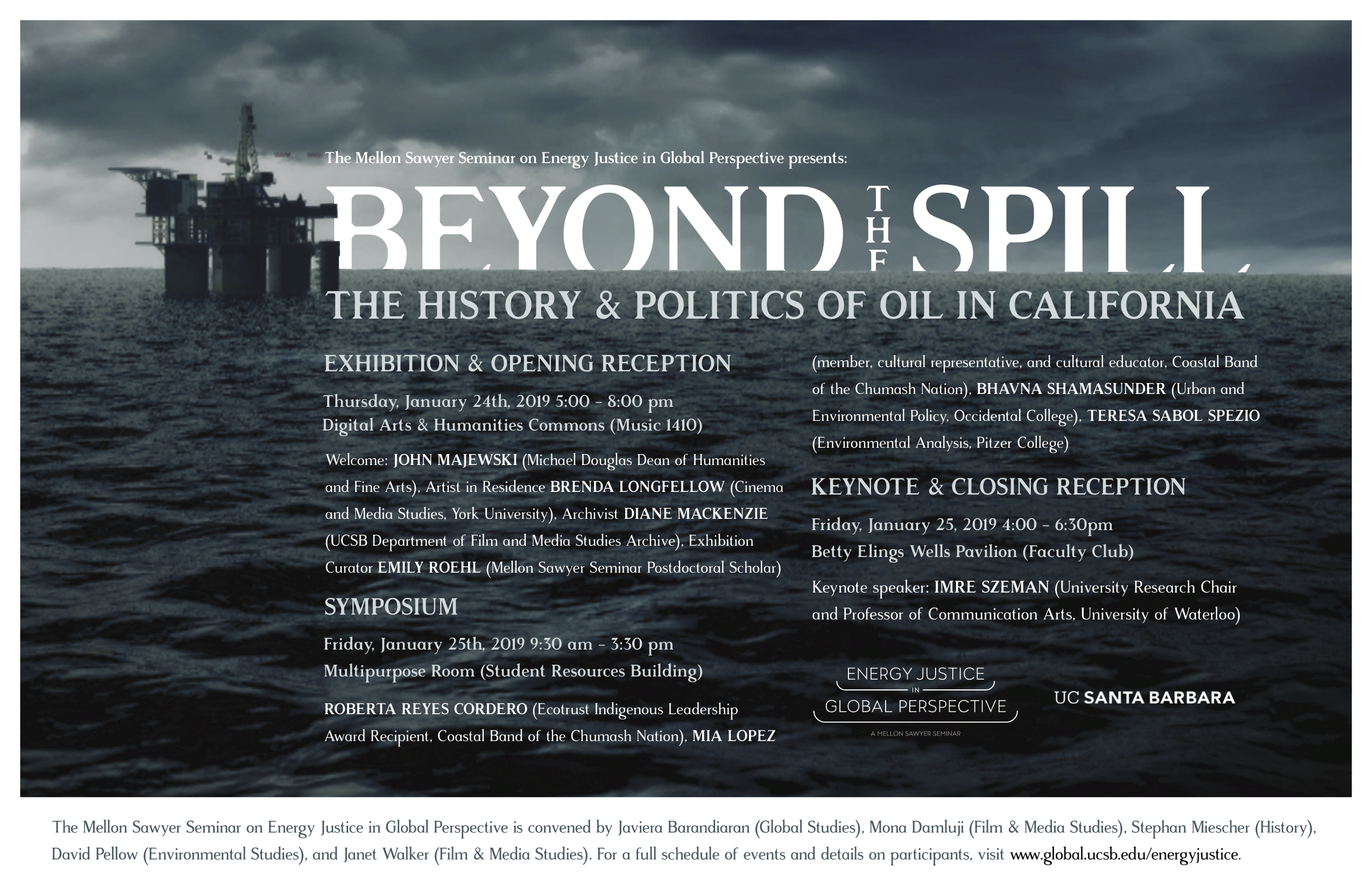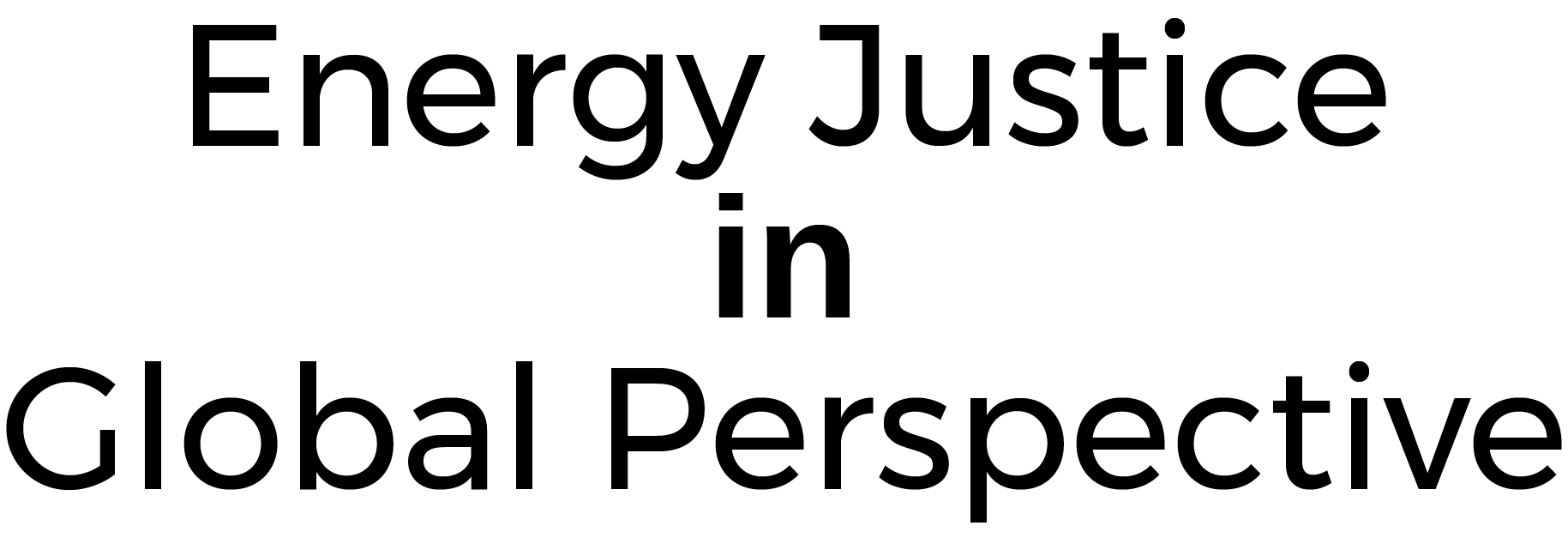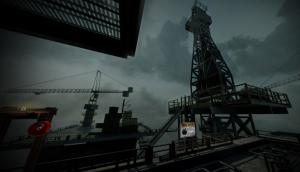Event Date:

Exhibition and Opening Reception
Thursday, January 24
5:00pm - 8:00pm
Digital Arts and Humanities Commons and Wireframe Studio (Music 1410)
Join us as we celebrate the opening of BEYOND THE SPILL with an exhibition and artist talk by Brenda Longfellow. The exhibition will feature Longfellow's groundbreaking interactive documentary OFFSHORE as well as "A Field Guide to Oil in Santa Barbara," an interactive archive and map created by graduate students in the fall quarter Sawyer Seminar course. The exhibition is curated by Mellon Sawyer Seminar Postdoctoral Scholar Emily Roehl.
Opening Reception and Exhibition Schedule
5:00pm: Reception begins
6:00pm: Welcome: John Majewski, Michael Douglas Dean of Humanities and Fine Arts, UCSB
6:10pm: Artist talk: Brenda Longfellow (Cinema and Media Arts, York University)
6:45pm: Curator talk: Emily Roehl (Mellon Sawyer Seminar Postdoctoral Scholar)
8:00pm: Reception ends
_____
Beyond the Spill Symposium
Friday, January 25
9:30am - 6:30pm
Multipurpose Room (Student Resource Building) and Betty Elings Wells Paviliion (Faculty Club)
Symposium Schedule
Multipurpose Room (Student Resource Building)
9:30am - 3:30pm
9:30-10:00: Coffee
10:00-12:00: PANEL 1: LOCATING IMPACTS
Featuring Bhavna Shamasunder (Associate Professor of Urban and Environmental Policy, Occidental College) and Teresa Sabol Spezio(Visiting Assistant Professor of Environmental Analysis, Pitzer College) in conversation with Javiera Barandiaran (Assistant Professor of Global Studies, UCSB)
12:00-1:00: LUNCH WORKSHOP: LOCALIZING ACTION
Featuring Emily Williams (350 Santa Barbara, PhD Candidate, Geography, UCSB) and others (TBA)
1:30-3:30: PANEL 2: INDIGENIZING OUR WORLDVIEW
Featuring Mia Lopez (member, cultural representative, and cultural educator, Coastal Band of the Chumash Nation) and Roberta Reyes Cordero (Ecotrust Indigenous Leadership Award Recipient, Coastal Band of the Chumash Nation) in conversation with Julie Maldonado (Lecturer in Environmental Studies, UCSB)
Keynote with Imre Szeman and Closing Reception Schedule
Friday, January 25
4:00pm - 6:30pm
Betty Elings Wells Pavillion (Faculty Club)
4:00-5:00: KEYNOTE ADDRESS: IMAGINING FUTURES
Featuring Imre Szeman (University Research Chair and Professor of Communication Arts, University of Waterloo)
5:00-5:30: Closing Discussion
Comments and Q&A moderated by Mona Damluji (Assistant Professor of Film and Media Studies, UCSB)
5:30-6:30: Closing Reception
PARTICIPANTS
Artist in Residence: Brenda Longfellow (Associate Professor in the Department of Cinema & Media Arts, York University)
Brenda Longfellow is Associate Professor in the Department of Cinema & Media Arts at York University and will be an artist in residence at the Squire Foundation in Santa Barbara during the month of January. Longfellow's documentaries have been screened and broadcast internationally, winning prestigious awards including the Audience Award for Best Experimental Film for Dead Ducks at the Santa Cruz Film Festival (2011); a Bronze Remi Award for Weather Report at the Houston Film Festival (2008); Best Cultural Documentary for Tina in Mexico at the Havana International Film Festival (2002); a Canadian Genie for Shadowmaker / Gwendolyn MacEwen, Poet (1998) and the Grand Prix at Oberhausen for Our Marilyn (1988). She recently launched the SSHRC-funded interactive web documentary OFFSHORE, co-directed with Glen Richards and Helios Design Lab.
Keynote speaker: Imre Szeman (University Research Chair and Professor of Communication Arts, University of Waterloo)
Imre Szeman's main areas of research are in energy and environmental studies, social and political philosophy, and critical theory and cultural studies. From 1999-2009, Szeman taught at McMaster University, and from 2009 to 2016 he worked at the University of Alberta. At Waterloo, he teaches and is conducting research on environmental communication, energy justice, literary and critical theory, and cultural studies. Szeman is co-founder of the Petrocultures Research Group and author or editor of a number of field-shaping texts in the energy humanities, including Energy Humanities: An Anthology, Petrocultures: Oil, Politics, Culture, and After Oil).
Roberta Reyes Cordero (Ecotrust Indigenous Leadership Award Recipient, Coastal Band of the Chumash Nation)
Roberta Reyes Cordero, who was born and raised in Santa Barbara, is deeply engaged in the revitalization of Chumash indigenous culture and has for many years vigorously advocated for tribal participation in policy-making public processes affecting the environment. In 2014, she received the distinguished Ecotrust Indigenous Leadership Award, given to indigenous leaders for dedication to their culture and work to improve economic and environmental conditions of their homelands and people.
Mia Lopez (member, cultural representative, and cultural educator, Coastal Band of the Chumash Nation)
Mia Lopez (Chumash) is the cultural representative and former tribal chair of the Coastal Band of the Chumash Nation. She is registered with the Native American Heritage Commission as the Most Likely Descendant to protect sacred Chumash sites and villages in the city of Santa Barbara and around the county. Lopez serves on the board of directors for the Chumash Maritime Association and the American Indian Health & Services clinic, and she is a frequent guest lecturer at UC Santa Barbara and Santa Barbara City College. At UCSB, Lopez guest lectures in Linguistics, Anthropology, Religious Studies, and other courses, and during the 2016-17 academic year, she served as the cultural consultant to the Sacred Art in the Age of Contact course and art exhibit shown concurrently at the Art, Design & Architecture Museum (UCSB) and the Santa Barbara Historical Museum. She also serves as the cultural consultant to a new UCSB Anthropology practicum in field and lab analysis, where students are processing collections from Limuw/Santa Cruz Island. In May 2017, Lopez helped organize the Water is Life: Standing With Standing Rock conference at UCSB, and in November 2017, Lopez was recognized by the UCSB American Indian Student Association for her academic contributions to campus. Lopez, a member of the Syuxtun Plant Mentorship Collective, is a partner to the Wishtoyo Chumash Foundation's education program, where she teaches third- and fourth-graders about local, living Chumash culture. Elsewhere, in Santa Barbara and Goleta classrooms, plus the Santa Barbara Museum of Natural History, the El Presidio de Santa Barbara, and the Santa Barbara Botanic Garden, Lopez is a regular lecturer on contemporary and historical Chumash culture. When Lopez is not in the classroom, she is working with her community on a revitalization project for the šmuwi? Chumash language, in which she sings, alongside other members of the Chumash Family Singers group, which includes her three children. For more information, please email Lopez at mialopez2424@gmail.com.
Bhavna Shamasunder (Associate Professor of Urban and Environmental Policy, Occidental College)
Bhavna Shamasunder teaches and conducts research at the intersection of environmental health & justice with a focus on inequalities faced by low-income communities and communities of color who live and work in urban and/or industrial environments. She is currently working on a project on environmental justice impacts from oil extraction and new unconventional drilling practices in Los Angeles.
Teresa Sabol Spezio (Visiting Assistant Professor of Environmental Analysis, Pitzer College)
Teresa Sabol Spezio’s research interests involve the historical relationship between humans and human-created industrial pollution. In her projects, she is engaged by humans’ reactions to the presence of industrial chemicals and oil in their communities. Her current research project explores the intersections of environmental risk, environmental contamination, and environmental justice. Specifically, she is interested in the practice of the remediation of uncontrolled hazardous waste sites in the United States.
Emily Williams (350 Santa Barbara, PhD Candidate in Geography, UCSB)
Emily Williams is a graduate student and NSF fellow (Graduate Research Fellowship Program) in Geography at UC Santa Barbara, a member of 350 Santa Barbara, a co-founder of the Climate Justice Project, and part of the Fossil Free UC Alumni Core Team. She did her undergraduate work at UCSB, graduating in 2013 with a B.S in environmental studies. While at UCSB, she was heavily involved in scholar activism: she interned for two summers with the NASA DEVELOP National Program at Ames Research Center, conducted her senior thesis on quantifying the external costs of coal and relating them to UCSB’s investment policy, and cofounded the Fossil Free UC campaign.


